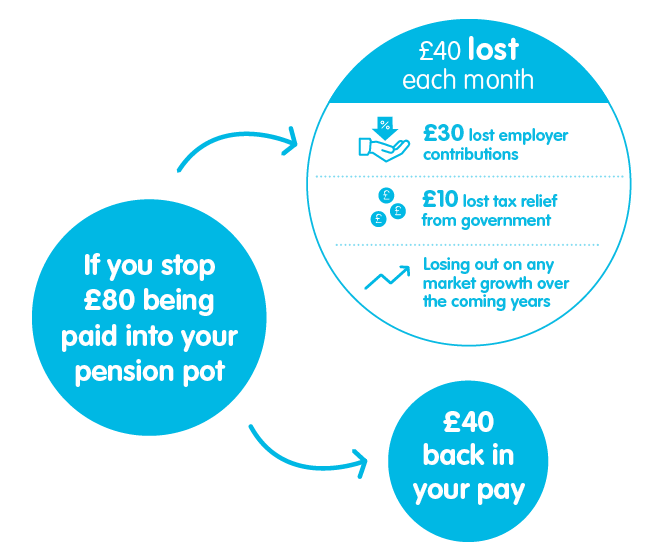The rising cost of living
Everywhere you look prices are on the rise and news articles are awash with handy tips to save money. However, for many people, tips like cutting back on a takeaway coffee once a week will not make a significant difference to their finances.
For some, reducing how much they pay into their pension might seem like a quick and easy win – a way of giving their take-home pay a little boost. But if you’re considering this, have a read of the following before you make that decision.
If you’re worried about the rising cost of living or experiencing financial difficulty, you can get independent guidance and advice on how to keep on top of your money and access the support that’s available. MoneyHelper is a good place to start. Alternatively, you can speak to a financial adviser, who may charge you for their services.
What happens to my pension pot if I cut back my contributions?
The money will remain invested to grow, but without regular contributions, the money you get at retirement could be significantly less. Your future self will not be pleased as this could influence how and when you can afford to stop working.
You might also miss out on ‘free money’ from the government in the form of tax relief on your pension savings, and your employer could choose to stop paying in too.
If I stop paying in, will I get all my money instead?
If you stop paying into your pension, it doesn’t mean the equivalent amount will end up in your bank account. And here’s why…
As a rough example, if you have £80 going into your pension pot each month, and you stopped paying in, you’re likely to only take home around £40 a month extra.1
That’s because the other £40 is made up of your employer’s contributions and tax relief. You’re effectively choosing to not get that little hidden bonus each month.
However, we know that times are tough with the cost of living going up, so if you want to take a ‘pensions payment holiday’, please give us a call and we can explain the implications.

1The example in the diagram above assumes the employee is 45 years old, with salary of £18,240 per year and qualifying earnings of £12,000 per year. It assumes you pay 5% (including tax relief) and your employer pays 3% of your contributions. Your personal situation may be different and your employer may offer more generous terms. It also shows what happens when contributions are made after tax, and basic rate tax relief is claimed for you. Higher rate and additional rate taxpayers will need to claim further tax relief through their tax returns. The calculation will differ where contributions are made before tax has been taken and tax relief is received automatically. Find out more about tax relief.

If you still decide you need to cut back your pension saving…
I need to take a break, but can I pay in again in the future?
When you’re ready to start paying in again, simply ask your employer to put you back into the scheme. It’s officially called ‘re-enrolling’ – but don’t worry about the jargon. All you need to know is that once again you’ll be saving for a better future.
Stopping paying in sounds like a bad idea, can I lower the amount I pay in instead?
You can ask your employer if they can reduce your contributions instead, to below the minimum contribution levels. But your employer would no longer have a legal obligation to pay anything into your pension pot. So you still risk losing ‘free’ money from them – it depends what they’re happy to agree with you.
If your employer can support you in reducing your pension contributions, it means you could get a little extra in your pay packet and still have money going into your pension pot, which is better for your future self than stopping your pension contributions altogether.
If that’s something you’d like to do, there’s more information in our knowledge base about reducing contributions. And when the time is right, you can always increase your contributions again by speaking to your employer.
How do I keep my relationship with you going if I stop paying in?
If you do decide to stop paying in, all is not lost. You have other options to stay connected with your pension:
- You can ask to re-join at any time by asking your employer, or your employer may put you back in automatically after 3 years as part of a process called ‘re-enrolment‘.
- You can also make ad-hoc payments if you find yourself with any spare cash.
Can I dip into my pension pot?
If you’re 55 or over, then dipping into your pension pot might seem like a good idea but if you’re still working you could end up with a hefty tax bill as money you withdraw from your pension will be taxed as income as well as your salary – do you really want the government to take more of your hard-earned money?
There are also some unscrupulous people out there looking to scam you out of your money, so be aware of any offer that seems too good to be true, as you don’t want them to end up with your pension savings.
Speak to Pension Wise – a free and impartial guidance service provided by MoneyHelper – before you take your money.
If accessing your savings is something you have to do, then find out more on our How to take your pension money webpage.
We take good care of your money and invest it to give it the best chance to grow. Over the long run, pension savings typically perform better than money in a savings account. However, world events can cause fluctuations in financial markets, which can impact your savings. We’ve written a useful piece on how world events can afftect your pension and put it in our knowledge base.
Can I reduce how much I’m being charged?
If you’ve got more than one pension pot lying around, then you could be paying more in charges than you need to. Bringing all your old pots together in one place could save you money. You’ll need to do some investigating and each provider should be able to tell you how much you’re charged.
With us, we reduce the rate we charge you as your savings increase. You can find out how much you’ll pay on our annual management charge webpage. Moving all your pots to a provider with lower charges could boost your savings as more of your money remains invested to grow and less is taken out in charges.
Where do I go next?
Talk to us
If you want, we can talk you through your options and any implications. We’ll give you the facts and let you make up your own mind.
Help with the cost of living
You can get independent guidance, advice and support in relation to financial difficulty and the cost of living. MoneyHelper is a good place to start.
Cut back on pension saving
If you decide you still need to, you can stop paying into your pension – but you’ll miss out on ‘free money’ from employer contributions and tax relief.
